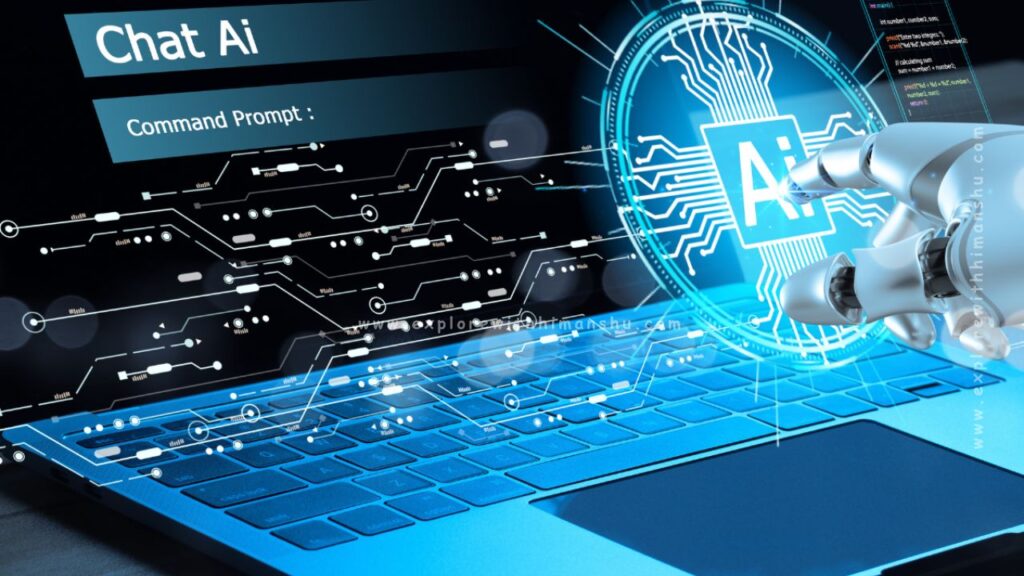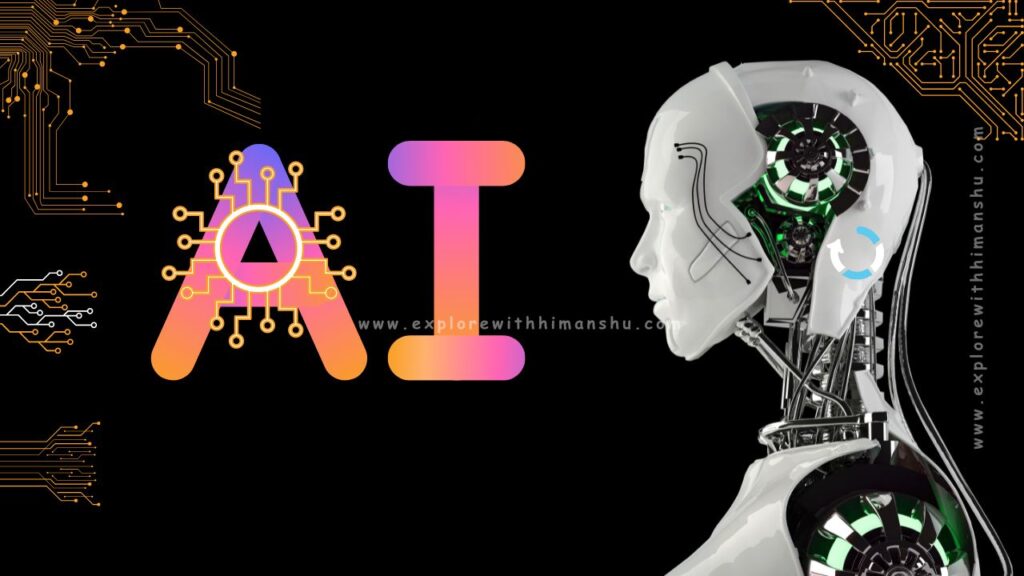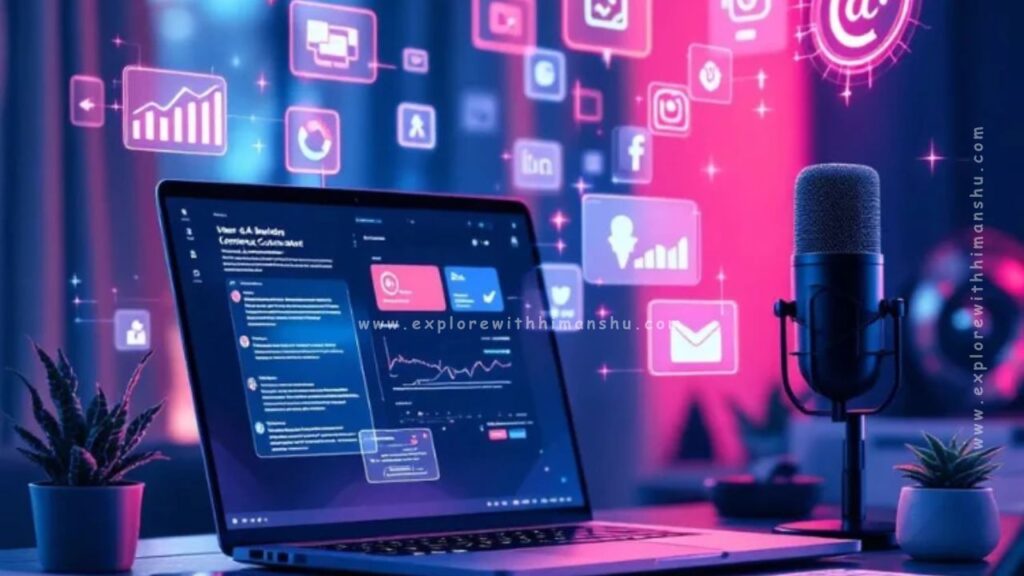Introduction :-
Artificial Intelligence (AI) has become a dominant force in content creation, remodeling industries along with advertising and marketing, journalism, entertainment, and training. As AI-pushed tools keep to evolve, companies and people leverage AI-generated content material to streamline workflows, decorate creativity, and increase efficiency. However, this rapid advancement also raises concerns approximately authenticity, originality, and ethical implications.
Unstoppable AI-generated content is revolutionizing digital media in 2025! Discover how artificial intelligence is transforming content creation, marketing, and journalism along with its challenges, benefits, and future impact. AI-generated content material refers to textual content, pics, movies, and audio created through synthetic intelligence algorithms.
In this blog, we’ll explore the rise of AI-generated content, its benefits, challenges, impact on different industries, case studies, and what the future holds for AI in digital media.

What is AI-Generated Content?
AI-generated content refers to text, images, videos, and audio created by artificial intelligence algorithms. These systems use deep learning, natural language processing (NLP), and generative adversarial networks (GANs) to produce human-like content. Some of the most popular AI tools include:
- ChatGPT and Jasper AI (Text generation)
- DALL·E and MidJourney (AI-generated images)
- RunwayML and Synthesia (AI video creation)
- Murf AI and Resemble AI (AI voice generation)
These tools have revolutionized content creation, enabling users to produce high-quality materials in minutes rather than hours or days.
AI-Generated Content: A Game Changer for Digital Media
AI-generated content material has quick turn out to be an essential part of digital advertising and marketing, journalism, and enjoyment. The capability to produce exquisite, engaging content in a matter of seconds has made AI an essential asset for agencies seeking to scale their online presence. AI can generate search engine marketing-pleasant weblog posts, compelling social media captions, sensible deepfake motion pictures, personalized emails, and even complete-fledged information articles. Major corporations, media homes, and tech startups are investing heavily in AI-powered content introduction equipment to automate their workflows and decorate user engagement.
Key Benefits of AI-Generated Content
1. Speed and Efficiency
AI-driven tools can generate content in seconds, significantly reducing production time. Writers, marketers, and businesses can automate repetitive tasks and focus on strategy and creativity.
2. Cost-Effectiveness
Hiring professional writers, designers, or videographers can be expensive. AI tools provide an affordable alternative, making high-quality content creation accessible to startups and small businesses.
3. Personalization and Audience Targeting
AI analyzes user behavior and preferences to generate personalized content, improving engagement and conversion rates.
4. Scalability
Brands can produce a high volume of content without compromising quality. AI-generated materials can be adapted for different platforms, languages, and audiences.
5. Enhanced Creativity
AI assists human creators by generating ideas, writing drafts, and suggesting design elements, fostering innovation and originality.
The Impact of Artificial Intelligence on Employment: Replacing Jobs or Creating Opportunities?

Challenges and Ethical Concerns
1. Authenticity and Plagiarism
AI-generated content may lack originality and authenticity, leading to plagiarism concerns. Businesses must ensure that AI-assisted content is unique and properly cited.
2. Misinformation and Deepfakes
AI can be misused to spread fake news and create deepfake videos, impacting credibility and trust. Regulations and ethical guidelines are crucial in combating misinformation.
3. Job Displacement
Automation may replace certain roles in content creation, affecting employment opportunities for writers, designers, and video editors.
4. Lack of Emotional Depth
While AI can mimic human writing styles, it struggles with emotional nuances, cultural context, and deep storytelling.
5. SEO and Algorithm Updates
Search engines constantly update algorithms to detect AI-generated content. Overreliance on AI for content creation may impact rankings if not properly optimized.
Case Studies: AI in Action
1. The Washington Post’s Heliograf
The Washington Post developed Heliograf, an AI-powered writing tool that generates news articles and reports. During the 2020 Olympics, Heliograf published over 300 automated stories, demonstrating AI’s potential in journalism.
2. Netflix’s AI-Driven Content Recommendation
Netflix uses AI algorithms to analyze user preferences and suggest personalized content. This has significantly increased viewer engagement and retention rates.
3. Buzzfeed’s AI-Powered Content
Buzzfeed integrates AI to create quiz-based content, social media posts, and personalized articles, boosting user engagement and ad revenue.
4. YouTube’s AI Content Moderation
YouTube employs AI to filter inappropriate content and recommend videos based on user behavior, ensuring a safer and more relevant viewing experience.
5. AI in E-Commerce: Amazon and Shopify
Amazon and Shopify leverage AI-generated product descriptions, chatbots, and personalized recommendations to enhance customer experience and sales.

Future of AI-Generated Content in Digital Media
1. Advanced AI Writers and Editors
AI will continue improving, generating human-like content with better contextual understanding and emotional depth.
2. AI-Generated Videos and Films
Hollywood and independent creators will use AI to produce entire films, animation, and deepfake-powered marketing campaigns.
3. Interactive and Real-Time Content
AI-driven chatbots and virtual influencers will engage audiences in real-time, creating immersive and interactive experiences.
4. AI-Powered Music and Voice Synthesis
The music industry will see AI composing songs, generating synthetic voices, and producing AI-assisted remixes.
5. Ethical AI Regulations and Guidelines
Governments and tech companies will introduce stricter regulations to ensure responsible AI use, transparency, and authenticity in digital media.
Conclusion – AI-generated content
AI-generated content is revolutionizing digital media, offering businesses and creators unprecedented speed, efficiency, and personalization. However, ethical considerations, authenticity, and human oversight remain crucial in leveraging AI responsibly.
As AI maintains to conform, it’s miles crucial to strike a stability between automation and human creativity. Businesses that adapt to this alteration even as preserving originality and ethical requirements will thrive within the digital technology.
While AI gives great opportunities, it also gives challenges that require careful navigation. Content creators, entrepreneurs, and corporations should use AI tools as assistants as opposed to replacements. Human creativity, emotional intelligence, and moral choice-making are irreplaceable elements that AI can not absolutely reflect.
AI-generated content is revolutionizing virtual media, offering businesses and creators exceptional velocity, performance, and personalization. However, moral considerations, authenticity, and human oversight continue to be vital in leveraging AI responsibly.
The Future of AI-generated content is promising, however it calls for obligation, adaptability, and a commitment to fine. By harnessing AI’s energy thoughtfully, companies can create engaging, progressive, and true digital reports that captivate audiences and force lengthy-term growth.
As AI continues to evolve, it is essential to strike a balance between automation and human creativity. Businesses that adapt to this transformation while maintaining originality and ethical standards will thrive in the digital era.
What are your thoughts on AI-generated content? Do you see it as a threat or an opportunity? Share your insights in the comments!


